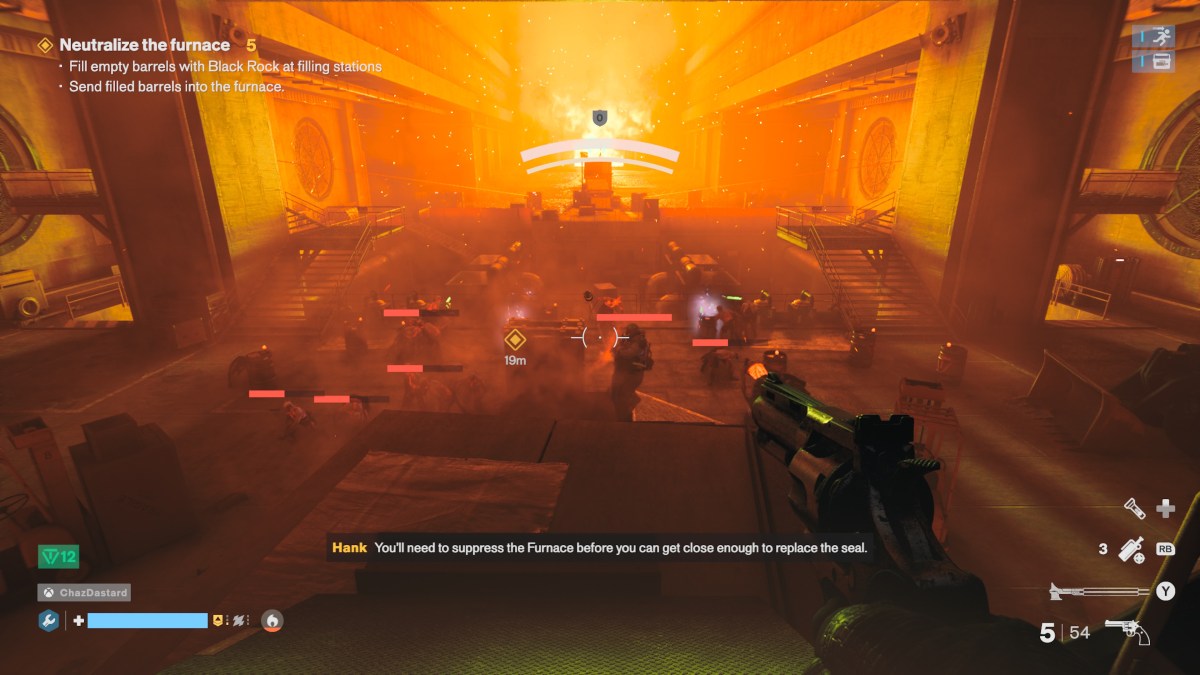Remedy Entertainment, masters of compelling lore and unique, winding stories, took a risk with FBC: Firebreak. Its usual crowd are the freak lovers: those who enjoy a good monster, an encroaching sense of creepiness, and the tickle you get at the back of your neck when something is quite wrong. FBC: Firebreak only somewhat leans into this freakiness, with its otherwise familiar FPS gameplay and co-op tactics rendering the game a bit too safe, and a bit less freaky than it should be.
It arrives as a relatively by-the-numbers co-op game with only a hint of the studio’s usual flavour. It is a solid, mechanically-intuitive shooter with a novel array of puzzle stages to fight through, but there is a sense it could’ve been much more.
The premise here is straight down the middle. You are a member of Firebreak, the elite soldier unit of the Federal Bureau of Control – an organisation fighting back against the chaos of magical, supernatural powers. Wielding an array of special tools (wrenches, fire hoses, electric weaponry), you must jump into various scenarios taking place in the Oldest House (the headquarters of the FBC, and a pretty freaky building) and use your expertise to fight back against growing threats.
Each siloed threat is different enough from the other that you jump into rounds of FBC: Firebreak, and get a new experience every time. That said, some experiences are better-designed than others, making it an eclectic mix. Hot Fix was a personal favourite in my time with the game, for its escalating sense of panic. Cleverly, FBC: Firebreak splits its main stages into three unique levels, with different tasks awaiting in each.

As you succeed in the easier versions of stages (whether solo or with friends), you’ll gain higher ‘clearance’ to unlock harder stages. While there is repetition, each clearance level unlocks a new area, providing fresh threats and complications in your journey to save the FBC.
Read: The 10 best video games of 2025 so far
Hot Fix begins with a task to fix fans by using various tools to repair stations. You’ll jump into these fans, hit them with wrenches, and take part in a reflex-based mini-game to recharge power banks. All the while, you’re consistently assailed by corrupted guards, moaning and groaning their way to you, or unleashing firepower in your direction. Run through corridors, shoot them away, and continue your repairing journey. Simple.
But the final stage of Hot Fix hides a secret: a nifty boss battle against an exploding furnace. Balancing your need to defend yourself with a need to shut this down, you’ll spend your time corralling barrels of Black Rock (a neutralising agent) into the maw of the furnace, while taking cover to avoid fire blasts.
You’ll find an array of other cleverly-designed boss battles elsewhere in FBC: Firebreak, with the Paper Chase stage leading into a visually and mechanically cool dance with a wad of sentient sticky notes (his name is Sticky Ricky).
It’s in these moments that FBC: Firebreak shines with a natural charm, and where Remedy’s vision is most clear. It’s a studio that wants to be weird. Its monsters define it. In moments where you’re desperately stuck in a corner, facing off with an oozing, swarming mass of paper in the shape of an enormous ghoul, you can see exactly how this game spun out of Control. You can lose yourself in a panic, and feel the rush of your survival instincts kicking in.
It seems a shame that there’s so much busywork to get to these moments, and that a need to stretch out content for replayability means these bosses are relegated to special attractions at high clearance levels. Most of the time, you’ll really just be stomping through repetitive stages.

Most of the levels in FBC: Firebreak revolve around simple tasks. Fix the fans. Gather Black Rock. Destroy sticky notes. Melt sentient ice crystals. You’ll take on the same stages over and over, completing these tasks, while shooting any roving enemies.
Occasionally, these tasks are broken up by the appearance of Corrupted Items. A sentient pickaxe summons strange anomalies. A strange Ramen Lantern will darken stages. These add challenge, and some of that all-important weirdness, but they don’t overtly shake up the formula.
For a studio so focused on deep lore and deft writing, it’s also surprising that many of these tasks and circumstances aren’t explained at all. You may collect dossiers of information in your travels, but these are textless items. In Paper Chase, you’re simply dropped into the world, and must figure out how to destroy thousands of sticky notes for yourself.
You know you’re part of the Firebreak unit, but you don’t have a sense of identity or purpose. If you sit on the game’s loading screen, you’ll get soundbites over a PA system, indicating a bit more about your world. But for the most part, you’re operating without guidance, and without necessary context for each shotgun blast or wrench swing.
Who are the corrupted Firebreakers summoned in each stage? What are the glowing beings, or the figures floating in chairs? What exactly happened in the FBC? You can understand some of this context if you’ve played Control, with many of the same creatures and paranatural circumstances replicated here. But FBC: Firebreak holds its secrets close, making each stage feel less meaningful than it would otherwise. With more storytelling baked in, it would feel higher-staked. It would feel more personal. There would be impetus to your actions, and a sense that you’re fighting for a brighter future.
As it stands, with a simpler approach, FBC: Firebreak feels like a surface-level take of Remedy Entertainment’s world. In patches, it’s fantastic and euphoric, particularly as you’re facing down novel, freaky bosses in heart-pounding battles. But these moments are not sustained, and they don’t avoid the lull of repetition in longer-term play.
You can still have a brilliant time in FBC: Firebreak, particularly when you’re taking on bosses in teams. But there are significant hurdles to fully enjoying the experience, and to finding reward in its many combat encounters.
An Xbox Series X/S code for FBC: Firebreak was provided by the publisher for the purposes of this review.





